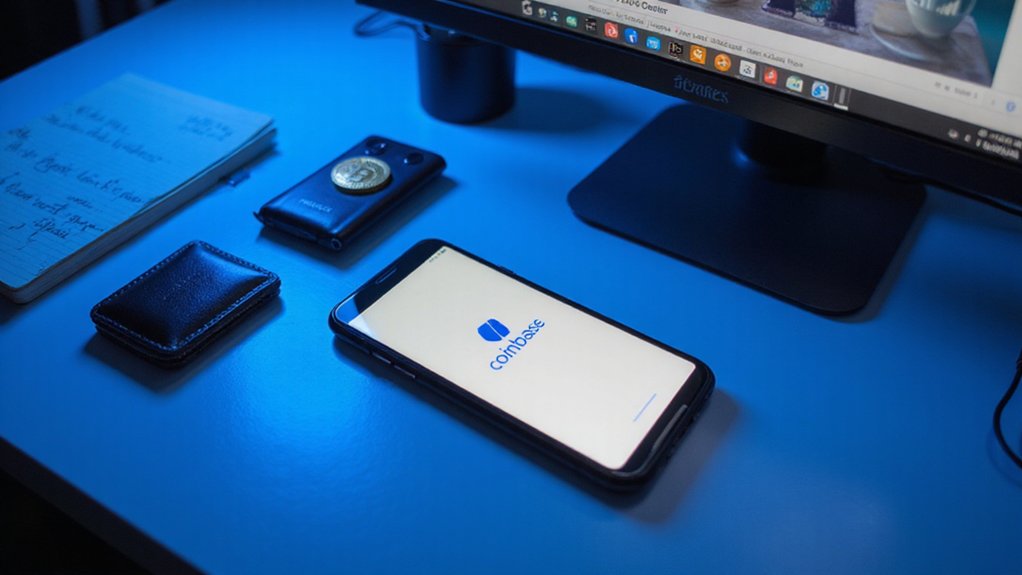For fastest Coinbase support, authenticate through help.coinbase.com and utilize 24/7 live chat—the digital equivalent of skipping the DMV line. Time-sensitive issues warrant the callback feature, while account access problems necessitate email support. The Help Center’s issue categorization system functions as a bureaucratic shortcut, directing users to tailored assistance options. When all digital avenues fail, the telephone support line (1-888-908-7930) serves as a last resort, though response times fluctuate with market volatility. The deeper labyrinth awaits the truly persistent.

When cryptocurrency complications arise, traversing the labyrinthine support systems of digital asset platforms can become an exercise in patience.
Coinbase, however, has established multiple support channels designed to address user concerns with varying degrees of urgency and complexity—though one might reasonably question whether the architecture of their customer service infrastructure truly accommodates the time-sensitive nature of cryptocurrency transactions.
Users seeking immediate assistance would be well-advised to utilize Coinbase‘s 24/7 support options, particularly the live chat and callback features accessible through help.coinbase.com after authentication.
For time-sensitive crypto dilemmas, Coinbase’s authenticated live chat and callback services offer the most expeditious path to resolution.
These interactive channels typically yield the most expeditious results when tackling technical quagmires or addressing security concerns (which, given the stakes involved in digital asset custody, represent no trivial matter).
For those unable to access their accounts—a predicament not uncommon in the volatile landscape of cryptocurrency platforms—email support remains the primary lifeline.
The prudent approach begins at the Help Center, where users must first categorize their issue under the appropriate taxonomy.
This initial classification—far from a mere bureaucratic formality—determines the trajectory of one’s support journey.
Selecting the relevant problem category under “Get support with your issue” directs users to tailored assistance options, including the coveted “Request a call” or “Live chat” buttons.
For matters requiring formal documentation, written complaints may be submitted via U.S. mail to Coinbase’s New York address or through their online complaint form.
These submissions initiate a 15-business-day review process overseen by a Customer Complaint Officer—a timeframe that might seem glacial when watching one’s digital assets fluctuate in real-time.
Those facing persistent difficulties might consider Coinbase’s telephone support at 1-888-908-7930, though users should remain cognizant that response times may lengthen during periods of market volatility or increased support volume.
For users needing to locate their specific cryptocurrency address, the wallet address finder feature is accessible through the “Send/Receive” button on the web interface or the “Transfer” option in the mobile app.
In the peculiar domain of cryptocurrency support—where tangible assistance for intangible assets remains paradoxically elusive—setting realistic expectations about resolution timelines may prove the most valuable investment strategy.
For Illinois residents experiencing unresolved issues, complaints can be directed to the Division of Financial and Professional Regulation at their Springfield, IL address after first attempting to resolve the matter directly with Coinbase.
Frequently Asked Questions
How Long Do Coinbase Withdrawals Typically Take to Process?
Coinbase withdrawal timeframes vary considerably based on the chosen method.
Instant cashouts typically complete within 30 minutes to 24 hours, while ACH transfers—the tortoise of the crypto withdrawal world—require 3-5 business days (or up to 10 calendar days when weekends intrude).
Selling crypto to a Coinbase cash balance happens instantaneously, though one must still navigate the subsequent transfer to external accounts.
Bank holidays, verification status, and transaction volumes may further extend these timelines.
Can I Recover Cryptocurrency Sent to the Wrong Address?
Unfortunately, cryptocurrency sent to incorrect addresses is generally unrecoverable—blockchain transactions being irreversible by design (a feature that’s simultaneously their greatest strength and most unforgiving weakness).
However, Coinbase offers limited recovery options for assets sent to wrong networks through their Asset Recovery service.
Users must provide transaction IDs and relevant addresses.
Prevention remains paramount: double-checking addresses, sending test amounts, and using simplified address tools like ENS can help avoid the stomach-dropping moment when one realizes funds have vanished into the digital ether.
Why Was My Account Suddenly Restricted or Limited?
Account restrictions on Coinbase typically stem from three primary catalysts: suspected fraudulent activity (unusual logins, transaction patterns, or VPN usage), regulatory compliance issues (incomplete KYC verification, geographical restrictions), or system-triggered security protocols.
During periods of market volatility or user growth surges, these restrictions increase markedly as the platform’s fraud detection systems operate with heightened vigilance.
The frustratingly opaque nature of these limitations—often communicated through generic error messages—represents the inevitable tension between security imperatives and user experience.
Does Coinbase Support Staking for All Cryptocurrencies?
No, Coinbase doesn’t support staking for all cryptocurrencies.
Their staking services are limited to select proof-of-stake assets including Ethereum, Cardano, Cosmos, Solana, and Tezos.
Bitcoin—despite its market dominance—remains significantly absent from this roster, as it operates on proof-of-work consensus.
Staking availability varies by jurisdiction, with regulatory constraints imposing additional limitations.
Coinbase plans to expand its staking offerings, though the timeline remains characteristically opaque for assets beyond their current supported lineup.
How Do I Report Suspicious Activity or Potential Fraud?
To report suspicious activity on Coinbase, users should navigate to the Help section and select “Contact Us” followed by “Report a Security Issue.”
Phishing attempts can be reported directly to [email protected] (including full URLs or email headers when applicable).
For compromised accounts, immediate lockdown is advisable through the security settings.
The platform’s investigative team—remarkably efficient, considering the industry’s generally lackluster response standards—typically reviews reports promptly, though particularly egregious cases may warrant notification to law enforcement as well.









